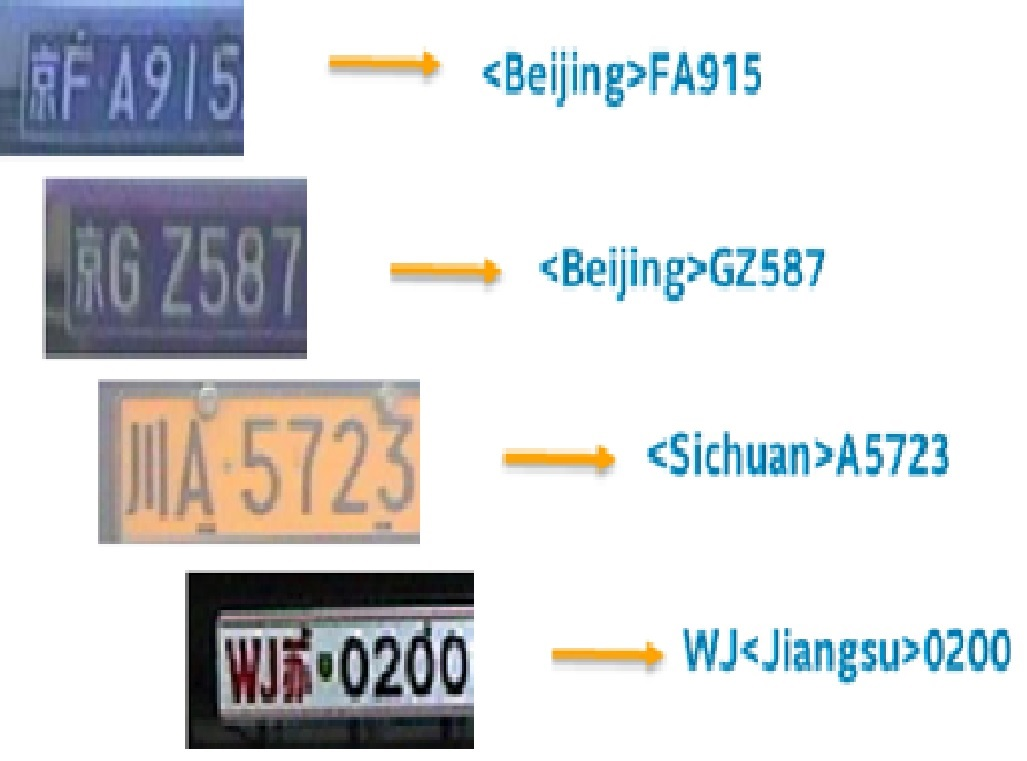license-plate-recognition-barrier-0007¶
Use Case and High-Level Description¶
This model uses a small-footprint network trained end-to-end to recognize Chinese license plates in traffic.
Validation Dataset - Internal¶
300320 Sythetic Chinese plates i.e. the plate text on them consists of symbols generated randomly (but to conform to the plate requirements in terms of the number of characters, sequence, shape, placement, etc.). The “real-looking” appearance of the plates (rotation, dirt, color, lighting, etc.) is achieved by a style transfer procedure.
Example¶
Note: The license plates on the image were modified to protect the owners’ privacy.

Specification¶
Metric |
Value |
|---|---|
Rotation in-plane |
±10˚ |
Rotation out-of-plane |
Yaw: ±45˚ / Pitch: ±45˚ |
Min plate width |
94 pixels |
Ratio of correct reads |
98% |
GFlops |
0.347 |
MParams |
1.435 |
Source framework |
TensorFlow* |
Limitations¶
Only “blue” license plates, which are common in public, were tested thoroughly. Other types of license plates may underperform.
Inputs¶
Original Model¶
Image, name: input, shape: 1, 24, 94, 3, format is 1, H, W, C, where:
C- channelH- heightW- width
Channel order is BGR.
Converted Model¶
Image, name: input, shape: 1, 24, 94, 3, format is 1, H, W, C, where:
C- channelH- heightW- width
Channel order is BGR.
Outputs¶
Original Model¶
Encoded vector of floats, name: d_predictions, shape: 1, 88, 1, 1. Each float
is an integer number encoding a character according to this dictionary:
0 0
1 1
2 2
3 3
4 4
5 5
6 6
7 7
8 8
9 9
10 <Anhui>
11 <Beijing>
12 <Chongqing>
13 <Fujian>
14 <Gansu>
15 <Guangdong>
16 <Guangxi>
17 <Guizhou>
18 <Hainan>
19 <Hebei>
20 <Heilongjiang>
21 <Henan>
22 <HongKong>
23 <Hubei>
24 <Hunan>
25 <InnerMongolia>
26 <Jiangsu>
27 <Jiangxi>
28 <Jilin>
29 <Liaoning>
30 <Macau>
31 <Ningxia>
32 <Qinghai>
33 <Shaanxi>
34 <Shandong>
35 <Shanghai>
36 <Shanxi>
37 <Sichuan>
38 <Tianjin>
39 <Tibet>
40 <Xinjiang>
41 <Yunnan>
42 <Zhejiang>
43 <police>
44 A
45 B
46 C
47 D
48 E
49 F
50 G
51 H
52 I
53 J
54 K
55 L
56 M
57 N
58 O
59 P
60 Q
61 R
62 S
63 T
64 U
65 V
66 W
67 X
68 Y
69 Z
Converted Model¶
Encoded vector of integers, name: d_predictions:0, shape: 1, 88. Each value
is an integer number encoding a character according to this dictionary:
0 0
1 1
2 2
3 3
4 4
5 5
6 6
7 7
8 8
9 9
10 <Anhui>
11 <Beijing>
12 <Chongqing>
13 <Fujian>
14 <Gansu>
15 <Guangdong>
16 <Guangxi>
17 <Guizhou>
18 <Hainan>
19 <Hebei>
20 <Heilongjiang>
21 <Henan>
22 <HongKong>
23 <Hubei>
24 <Hunan>
25 <InnerMongolia>
26 <Jiangsu>
27 <Jiangxi>
28 <Jilin>
29 <Liaoning>
30 <Macau>
31 <Ningxia>
32 <Qinghai>
33 <Shaanxi>
34 <Shandong>
35 <Shanghai>
36 <Shanxi>
37 <Sichuan>
38 <Tianjin>
39 <Tibet>
40 <Xinjiang>
41 <Yunnan>
42 <Zhejiang>
43 <police>
44 A
45 B
46 C
47 D
48 E
49 F
50 G
51 H
52 I
53 J
54 K
55 L
56 M
57 N
58 O
59 P
60 Q
61 R
62 S
63 T
64 U
65 V
66 W
67 X
68 Y
69 Z
Download a Model and Convert it into OpenVINO™ IR Format¶
You can download models and if necessary convert them into OpenVINO™ IR format using the Model Downloader and other automation tools as shown in the examples below.
An example of using the Model Downloader:
omz_downloader --name <model_name>
An example of using the Model Converter:
omz_converter --name <model_name>
Demo usage¶
The model can be used in the following demos provided by the Open Model Zoo to show its capabilities:
Legal Information¶
The original model is distributed under the
Apache License, Version 2.0.
A copy of the license is provided in <omz_dir>/models/public/licenses/APACHE-2.0.txt.
[*] Other names and brands may be claimed as the property of others.